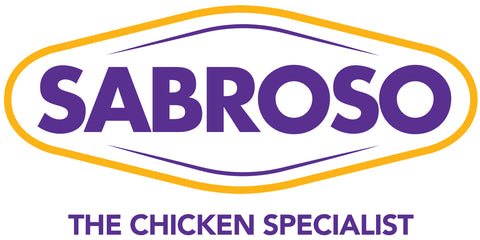CART
Your Cart is currently empty!
FAQs for Sabroso
FAQs About the Brand
1. What does Sabroso mean?
"Sabroso" is a Spanish word that means "tasty" or "delicious." It is often used to describe food that is flavorful and enjoyable to eat.
2. Is Sabroso a Pakistani brand?
Sabroso, launched in 2017, is a prominent Pakistani brand under the umbrella of Sabirs’ Group, one of the largest poultry groups in the country. Our headquarters are located in Lahore, with a state-of-the-art processing plant situated in Sheikhupura.
3. How does Sabroso ensure food safety and hygiene?
International standard quality assurance lab is a major contributor to the production process. Our quality assurance lab is equipped with the latest technology, and it not only monitors the entire integration process but also regulates it to ensure that all chicken and chicken products are full of nutrition and as per international food safety standards. All international HSE and Personal Protective Equipment Protocol (PPEP) have also been implemented in the plant.
The factor of traceability plays a vital role in determining the food safety and hygiene of our products. If there is a complaint regarding any pack of Sabroso’s product, we have the capability to trace it back to the batch of the flock it came from and further back to the breeder’s batch the flock hatched from. This gives us an edge in eliminating any type of threat to the other products by identifying the root cause of the problem.
The factor of traceability plays a vital role in determining the food safety and hygiene of our products. If there is a complaint regarding any pack of Sabroso’s product, we have the capability to trace it back to the batch of the flock it came from and further back to the breeder’s batch the flock hatched from. This gives us an edge in eliminating any type of threat to the other products by identifying the root cause of the problem.
4. What does it mean to be a fully vertically integrated company?
At Sabroso, being fully vertically integrated means, we manage every aspect of our chicken production, ensuring high standards and consistency across all our products.
Breeder Farms: We operate over 38 breeder farms with a capacity of 3.8 Million breeders. These breeders lay eggs over 52 weeks, which become broilers.
Hatcheries:
The eggs from breeders are taken to our state-of-the-art hatcheries, where they hatch into broilers in 21 days. Our hatcheries have one of the largest capacities in Pakistan, handling up to 275 Million chicks annually.
Broiler Farms:
The broilers, chickens raised for meat, are transported to our broiler farms where they are raised for 6 weeks before being sent to our processing plant.
Feed Mills:
Our feed mills produce high-quality feed for broilers and breeders, formulated with a balanced mix of protein, essential vitamins, minerals, and natural greens.
Processing Plant:
Our advanced processing plant can handle over 110,000 birds per day, preparing a range of products from raw cuts like boneless breasts to value-added items like “Nuggets” and “Crispy Poppers”.
Distribution:
Our products are packed and transported in -18°C cold-chain trucks to retailers, restaurants, hotels, and our own outlets. This comprehensive control allows Sabroso to maintain superior quality and food safety, reduce costs by eliminating intermediaries, quickly respond to market changes, and stay closely connected with our customers.
5. Are Sabroso products and the ingredients used in them halal?
Yes, all Sabroso products and ingredients are halal-certified by ACTS (Al-Waiz Certifications and Training Services). Sabroso’s chicken has been processed and prepared according to Islamic dietary laws as defined by ‘Shariah.’
6. How old is Sabroso?
In 2017, Sabirs' Group launched Sabroso, building on over 40 years of collective experience in the poultry industry.
7. Does Sabroso offer home delivery? In which cities?
Yes, Sabroso offers home delivery in the following cities: Lahore, Sheikhupura, Faisalabad, Gujrat, Gujranwala, Sialkot, Multan, Bahawalpur, Karachi, Hyderabad, Islamabad, Rawalpindi, Wah Cantt, Mianwali, Jhelum, Abbottabad, and Peshawar.
8. In which cities is Sabroso available?
Sabroso products are available in most major cities across Pakistan. Please visit your nearest supermarket for Sabroso products.
9. Does Sabroso have a loyalty program? How can I become a member?
Yes, Sabroso offers an exceptional loyalty program called the 'Chickmate Club,' where members can enjoy up to a 15% instant cashback discount. You can join by signing up on our website or by visiting the nearest Sabroso outlet. The program features four membership tiers: Basic, Silver, Gold, and Platinum.
10. How can I file a complaint with Sabroso?
The customer can cither file a complaint through the customer service number, that is 042-111-722-477, or he/she may file a complaint on the social media handle of Sabroso.
11. What is the return policy of Sabroso?
Sabroso maintains a no refund and no exchange policy due to the temperature-sensitive nature of our products.
12. How does Sabroso freeze its products?
Sabroso employs Individual Quick Freezing (IQF) technology & Blast Freezing technique for rapid freezing to keep protein levels intact. These freezing techniques also improve the shelf life of the products without adding any preservatives.
13. What is IQF technology?
IQF stands for ‘Individually Quick Frozen.’ It is a technology used in the food industry to quickly freeze individual pieces of food, such as fruits, vegetables, meats, and seafood. The key features and benefits of IQF technology include:
1. Rapid Freezing: The food is frozen very quickly, usually within 40-50 minutes, which helps to preserve the texture, flavor, and nutritional value of the food.
2. Individual Freezing: Each piece of food is frozen separately from the others. This means that the pieces do not stick together and can be easily separated after freezing.
3. High Quality: Because the food is frozen quickly, large ice crystals do not form. This helps to maintain the quality of the food, preventing damage to the cellular structure.
4. Convenience: IQF foods are easy to use because you can take out only the amount you need without having to defrost an entire package.
5. Extended Shelf Life: The rapid freezing process helps to preserve the food for a longer period, reducing the risk of spoilage and waste.
14. Are Sabroso products free from any harmful preservatives?
Yes, Sabroso products do not contain any harmful preservatives.
FAQs About Myths Related to Chicken
1. What is a broiler chicken? How is it different from a Desi chicken?
A broiler chicken is bred for meat production and is a naturally fast-growing breed, offering a great source of lean meat. In contrast, Desi chicken is a more traditional and slower-growing breed. While broiler chickens generally have slightly higher protein content, both types contain comparable levels of protein overall.
2. Are antibiotics given to the chickens harmful to humans?
Antibiotics are only administered to chickens if they are sick. These antibiotics are not harmful to humans due to the international standard 'withdrawal period.' To ensure antibiotic residues are not present in the meat, a mandated withdrawal period is observed. This is the time between the last administration of antibiotics and the slaughter of the animal. According to international standards, the withdrawal period is 7 days, a guideline that is strictly followed at Sabirs’ Group facilities.
3. Why are chickens given vaccines?
Vaccines are administered to chickens to protect them from viruses, enhancing their immune system for preventive measures. This vaccination is not harmful to humans.
4. Are hormones or steroids given to broiler chickens?
No, broiler chickens are not given hormones or steroids. They are bred to grow naturally.
5. Is it true that broilers become so big that they cannot walk on their feet?
No, this is a myth. Broilers are healthy and can walk normally.
6. What animal welfare practices does Sabroso take?
As per International standards, Sabroso fully abides by animal welfare practices to save the bird from physical injury, environmental stress, and mental stress. Good feed and water availability to the birds is yet another crucial determinant at Sabroso. The internationally required temperature, humidity, and air cleanliness for the well-being of chickens are provided at our facilities.
7. What is bird flu? Should I be concerned about eating chickens if there is an outbreak?
Bird flu is a viral disease that primarily affects birds, including domestic poultry such as chickens. In Pakistan, where poultry farming is a significant agricultural sector, bird flu remains a concern due to its potential impact on poultry health. However, the risk of humans contracting this disease from chickens is extremely low.
At Sabirs’ Group, we implement a meticulously designed biosecurity program across all our facilities to minimize the risk of disease transmission. By adhering to proper food handling and cooking practices, you can safely consume poultry products even during an outbreak. We advise you to follow all the cooking instructions mentioned on the back of our packaging.
Cooking-Related FAQs
1. What’s the difference between ready-to-cook or fully-cooked Sabroso products?
Ready-to-cook products require further cooking, while fully-cooked products are ready to eat after heating. We advise you to follow all the cooking instructions mentioned on the back of our packaging.
2. How do I differentiate between ready-to-cook or fully-cooked Sabroso products?
For a clear distinction, there is a logo placed on top left of each box, which helps the customer to choose the required product for usage.
3. What’s the best way to cook Sabroso frozen products?
Follow the cooking instructions on the package for the best results.
4. Can Sabroso products be air-fried?
Follow the cooking instructions on the package for the best results.
FAQs About Faulty Products
1. Why is there blood in the raw range product packet upon thawing?
There is no blood within the raw range. Actually, it’s a Pinkish drip loss, which occurs due to the release of water from meat, during the process of thawing.
2. Why is a specific product hard after cooking?
Overcooking or improper cooking methods can make the product hard. Follow the recommended cooking instructions.
3. Why is a specific product harder after cooking or broken into pieces during cooking as it is very soft (e.g., Kofta)?
This can happen due to overcooking or handling the product too roughly. Gentle cooking and handling are recommended.

